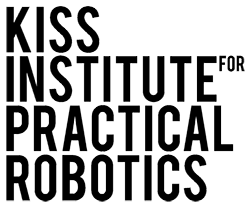Scarecrow was built by the KISS Institute for the AAAI-92 mobile robot contest. In this contest the robots had to prove that they could maneuver around obstacles, find designated objects, and visit those objects in a particular order. The arena was about eighty feet across and filled with cardboard boxes as obstacles. There were also ten poles which could be marked any way a team wanted. Most robots used cameras or laser bar code readers to find the poles, and the robots used precision dead reckoning to make a map of where the poles were. Scarecrow was built to show that for specialized problems there is usually a cheaper, simpler way. Scarecrow used only bump sensors and a conductive bar code reader. The robots on average cost about $150,000. Scarecrow cost about $300 and took about two weeks to build and test. Scarecrow’s computer’s program counter is powered by a spring and uses lever switches and relays to do all the computation. Scarecrow came in fourth out of the ten contestants, beating out (in no particular order): Georgia Tech, Johnson Space Center, IBM, MITRE, Brown University, and The University of Chicago
Scarecrow was built by David Miller & Jacob Milstein.
A movie of Scarecrow in action is available.
For the original webpage of information, please visit dpm.kipr.org.
